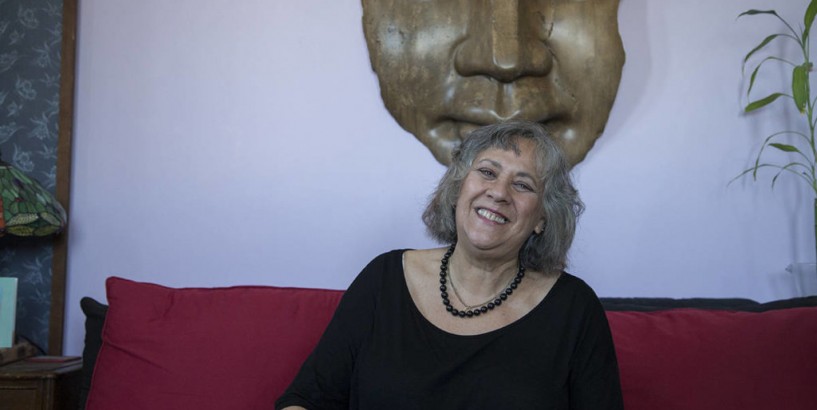After 45 years in The City, 38 spent in the same Noe Valley apartment, Denise Dunne made a deal early this year to move out by the summer and head East, to be closer to aging family members.
“The logistics of moving are expensive and difficult under any circumstances. But try moving during a pandemic,” said Dunne, knee deep in sifting and sorting through her San Francisco life.
Choosing to stay isolated since early March when the coronavirus first posed a threat to public health, Dunne’s relocation plans — whether to fly or drive, what to take, what to cast off, and what to put into storage — were largely determined by which services were open and available during the shutdown.
“I’ve had to pack my own stuff, people can’t help or do it for me” she said, though she’s not complaining.
“Just getting to do this is a privilege. I have friends who are really struggling right now.”
A native New Yorker, Dunne came to San Francisco in 1975 to get away from family, get in touch with her creative self and connect with other free-spirited people.
“I wanted to learn more about opening my mind toward building a different kind of society,” she said.
Denise Dunne shows off a Jimi Hendrix single from her classic rock collection. (Kevin N. Hume/S.F. Examiner)
Inspired by attending Woodstock and infused with a generational belief in alternative realities, she sought and found membership in countercultural communities. From Haight Ashbury Community Radio, the Straight Theater Company and pioneering, freeform FM station KSAN, to the punk rock scene at the Mabuhay Gardens and college radio station KUSF, she found her people and her passion through music. Working with the crew that live-broadcast historic shows by Bruce Springsteen from Winterland and the Ramones from Civic Center, among many others, she regularly produced live remotes from the Mabuhay and On Broadway. She also performed on-air and onstage as a DJ: She recalled a Pride gig where she had the crowd dancing to the Hokey Pokey at Civic Center Plaza. There were other highlights.
“It was a trip, getting to meet people who influenced me in the ‘60s and ‘70s, the Grateful Dead, David LaFlamme, Norman Greenbaum, then meeting people like Patti Smith and Deborah Harry and Bill Graham, and working with Flipper and the Avengers,” she said.
And there was another side to Dunne’s California experience.
“I explored drugs, my inner self and my own thinking. I’ve done vision quests and fire walks,” she said of more than half a lifetime devoted to seeking.
Sifting through her archived ephemera — a handbill from here, a badge from there, photographs, journals — she finds pieces of herself and others, reminders of friends and lovers who took the road less traveled and others who diverged from the path.
Denise Dunne, right, is pictured with a friend at the Old Waldorf in 1970. (Courtesy Denise Dunne)
“People go separate ways,” she said. “It’s OK. I’m grateful for the time I had with each of them.”
At mid-life, Dunne decided she wanted to take classes at City College and complete an associate’s degree, despite a disabling diagnosis of fibromyalgia.
“On a fluke I thought, what do I have to lose and applied to Mills College,” she said.“I was awarded a dean’s scholarship, full tuition paid, to study whatever I wanted.”
Graduating in 2016 with a bachelor’s degree from Mills’ renowned electronic music and composition program, the experience pulled into focus her lifelong passion for music and her pursuit of new frontiers.
“It really opened up the world of electronic music for me,” said Dunne, embracing the opportunity to learn from electronic music artists Maggi Payne and Fred Frith.
“I also loved studying music history and how it influenced social movements,” she said.
Noting after the flu epidemic of 1918, a huge cultural explosion marked the beginning of the Jazz Age, “This current cycle should bring about another creative burst,” said Dunne. “In a few years, it’s likely we will see something blossom.”
Though it’s disappointing to say goodbye with things boarded up citywide and without a gathering of friends, Dunne will be back. She likes the idea of becoming bicoastal and is counting on The City to remake itself again, post-pandemic.
“San Francisco’s history is like the phoenix that keeps rising,” she said. “With time to consider what we want to see in our community, in our arts and culture and what a special place it is, San Francisco will find a way to shine again.”
Denise Sullivan is an author, cultural worker and editor of “Your Golden Sun Still Shines: San Francisco Personal Histories & Small Fictions.” She is a guest columnist and her point of view is not necessarily that of the Examiner. Follow her at www.denisesullivan.com and on Twitter @4DeniseSullivan.
san francisco news
If you find our journalism valuable and relevant, please consider joining our Examiner membership program.
Find out more at www.sfexaminer.com/join/









